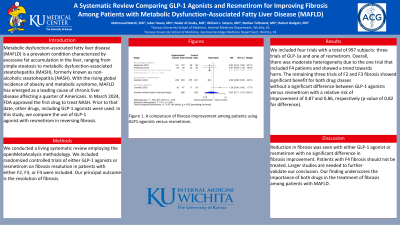Tuesday Poster Session
Category: Liver
P4615 - A Systematic Review Comparing GLP-Agonists and Resmetirom for Improving Fibrosis among Patients with Metabolic Dysfunction-Associated Fatty Liver Disease (MAFLD)
Tuesday, October 29, 2024
10:30 AM - 4:00 PM ET
Location: Exhibit Hall E

Has Audio

Mahmoud Mahdi, MD
University of Kansas School of Medicine
Wichita, KS
Presenting Author(s)
Mahmoud Mahdi, MD1, Hasan Jaber, MD2, Nader Al Souky, MD1, William J. Salyers, MD, MPH1, Nathan Tofteland, MD1, Robert Badgett, MD1
1University of Kansas School of Medicine, Wichita, KS; 2University of Kansas Medical Center, Wichita, KS
Introduction: Metabolic dysfunction-associated fatty liver disease (MAFLD) is a prevalent condition characterized by excessive fat accumulation in the liver, ranging from simple steatosis to metabolic dysfunction-associated steatohepatitis (MASH), formerly known as non-alcoholic steatohepatitis (NASH). With the rising global incidence of obesity and metabolic syndrome, MAFLD has emerged as a leading cause of chronic liver disease affecting a quarter of Americans. In March 2024, FDA approved the first drug to treat NASH. Prior to that date, other drugs, including GLP-1 agonists were used. In this study, we compare the use of GLP-1 agonist with resmetirom in reversing fibrosis.
Methods: We conducted a living systematic review employing the openMetaAnalysis methodology. We included randomized controlled trials of either GLP-1 agonists or resmetirom on fibrosis resolution in patients with either F2, F3, or F4 were included. Our principal outcome is the resolution of fibrosis.
Results: We included four trials with a total of 997 subjects: three trials of GLP-1a and one of resmetirom. Overall, there was moderate heterogeneity due to the one trial that included F4 patients and showed a trend towards harm. The remaining three trials of F2 and F3 fibrosis showed significant benefit for both drug classes without a significant difference between GLP-1 agonists versus resmetirom with a relative risk of improvement of 0.87 and 0.86, respectively (p-value of 0.82 for difference).
Discussion: Reduction in fibrosis was seen with either GLP-1 agonist or resmetirom with no significant difference in fibrosis improvement. Patients with F4 fibrosis should not be treated. Larger studies are needed to further validate our conclusion. Our finding underscores the importance of both drugs in the treatment of fibrosis among patients with MAFLD.

Disclosures:
Mahmoud Mahdi, MD1, Hasan Jaber, MD2, Nader Al Souky, MD1, William J. Salyers, MD, MPH1, Nathan Tofteland, MD1, Robert Badgett, MD1. P4615 - A Systematic Review Comparing GLP-Agonists and Resmetirom for Improving Fibrosis among Patients with Metabolic Dysfunction-Associated Fatty Liver Disease (MAFLD), ACG 2024 Annual Scientific Meeting Abstracts. Philadelphia, PA: American College of Gastroenterology.
1University of Kansas School of Medicine, Wichita, KS; 2University of Kansas Medical Center, Wichita, KS
Introduction: Metabolic dysfunction-associated fatty liver disease (MAFLD) is a prevalent condition characterized by excessive fat accumulation in the liver, ranging from simple steatosis to metabolic dysfunction-associated steatohepatitis (MASH), formerly known as non-alcoholic steatohepatitis (NASH). With the rising global incidence of obesity and metabolic syndrome, MAFLD has emerged as a leading cause of chronic liver disease affecting a quarter of Americans. In March 2024, FDA approved the first drug to treat NASH. Prior to that date, other drugs, including GLP-1 agonists were used. In this study, we compare the use of GLP-1 agonist with resmetirom in reversing fibrosis.
Methods: We conducted a living systematic review employing the openMetaAnalysis methodology. We included randomized controlled trials of either GLP-1 agonists or resmetirom on fibrosis resolution in patients with either F2, F3, or F4 were included. Our principal outcome is the resolution of fibrosis.
Results: We included four trials with a total of 997 subjects: three trials of GLP-1a and one of resmetirom. Overall, there was moderate heterogeneity due to the one trial that included F4 patients and showed a trend towards harm. The remaining three trials of F2 and F3 fibrosis showed significant benefit for both drug classes without a significant difference between GLP-1 agonists versus resmetirom with a relative risk of improvement of 0.87 and 0.86, respectively (p-value of 0.82 for difference).
Discussion: Reduction in fibrosis was seen with either GLP-1 agonist or resmetirom with no significant difference in fibrosis improvement. Patients with F4 fibrosis should not be treated. Larger studies are needed to further validate our conclusion. Our finding underscores the importance of both drugs in the treatment of fibrosis among patients with MAFLD.

Figure: A comparison of fibrosis improvement among patients using GLP1-agonists versus resmetirom.
Disclosures:
Mahmoud Mahdi indicated no relevant financial relationships.
Hasan Jaber indicated no relevant financial relationships.
Nader Al Souky indicated no relevant financial relationships.
William Salyers indicated no relevant financial relationships.
Nathan Tofteland indicated no relevant financial relationships.
Robert Badgett indicated no relevant financial relationships.
Mahmoud Mahdi, MD1, Hasan Jaber, MD2, Nader Al Souky, MD1, William J. Salyers, MD, MPH1, Nathan Tofteland, MD1, Robert Badgett, MD1. P4615 - A Systematic Review Comparing GLP-Agonists and Resmetirom for Improving Fibrosis among Patients with Metabolic Dysfunction-Associated Fatty Liver Disease (MAFLD), ACG 2024 Annual Scientific Meeting Abstracts. Philadelphia, PA: American College of Gastroenterology.
